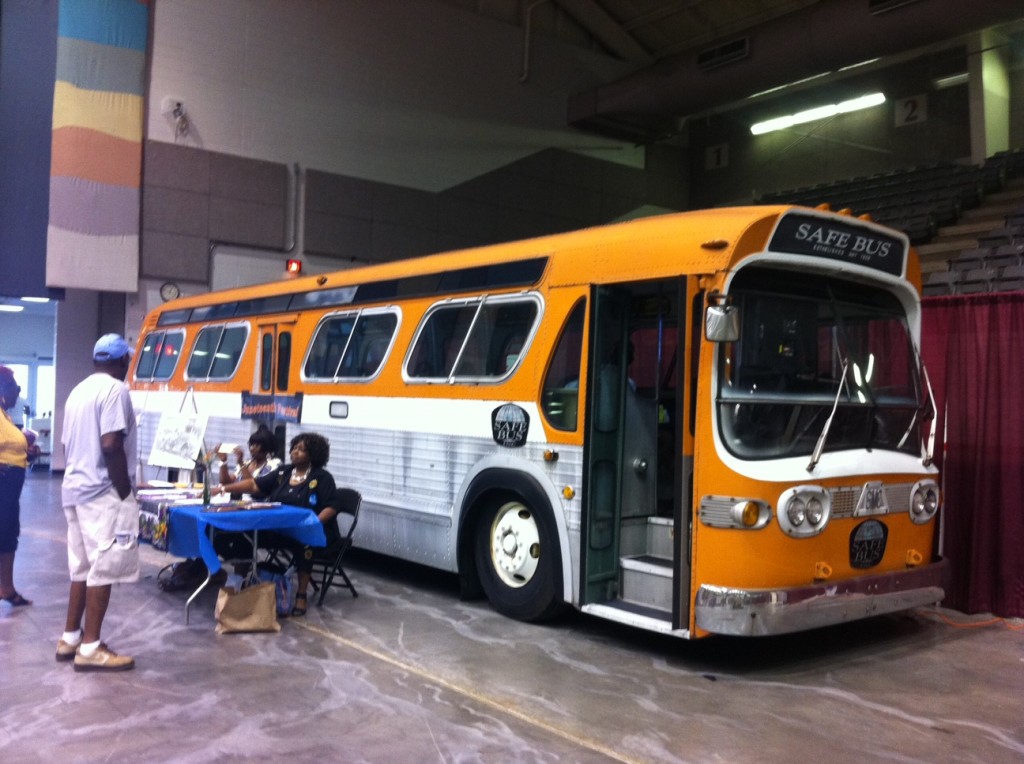
Sylvia, a youthful sixty something year old woman with a gorgeous, wide grin and I got on the bus around the same time. Little did I know how much she would teach me about growing up as an African American woman in Winston Salem, North Carolina (USA) in the 1960s. Had it not been for the exhibit at the Juneteenth Festival, which commemorates the ending of slavery in the United States, our paths might not have crossed. And had it been the 1960s, we would certainly never had met. 
But we did meet, at the Safe Bus exhibit yesterday. As we sat on the old Safe Bus, she told me about the many trips she took on the bus as a young woman growing up in the South. For those of you who don’t know, the Safe Bus Company was formed on May 24, 1926 in Winston Salem, North Carolina (USA) as a to serve the segregated African American section of the city so that workers could get to their jobs on time. Back then, there was no trolley service in the African American section of Winston Salem when R.J. Reynolds Tobacco Company’s plant was built in 1914. The Safe Buses’ typical routes, which took over for private jitney services, were focused on what was then called the CBD – Colored Business District.
Sylvia told me that East Winston was where African Americans lived when she was growing up. She recalled the day her brother sprained his ankle, and despite the local hospital being right down the street, her father had to carry him about ten blocks to the hospital where African Americans would be seen. The local hospital served whites from a neighboring community and if they had chosen to treat her brother, he would have only been seen in the basement, simply because he was black.
I asked her how old she was when she began to realize that something was seriously unjust. Her answer came quickly: “When I was twelve.” It was around that time that she noticed that her schoolbooks were already well used; they were handed down from kids at the white schools.
She spoke about the energy of the civil rights movement and the sit ins in Winston Salem and Greensboro – and how she desperately wanted to be involved but her mother would not allow it. She feared for her safety. She told me how she got her first job in 1968, downtown at the Kress store where the Winston Salem sit in took place, and how she was required to use the “blacks only” bathroom and water fountain.
 Ironically, meeting Sylvia coincided with me rereading Maya Angelou’s stellar book: “I Know Why the Caged Bird Sings.” I could hear Dr. Angelou’s stories reverberabating like church bells in my Northern ears, how in Stamps, Arkansas (USA) she had been refused to be seen by a dentist despite a horrific infection in her mouth. How the dentist told her grandmother that he’d rather stick his hand in a dog’s mouth than treat her grandbaby. How she had to travel more than twenty miles away to be seen by the dentist that would treat African Americans.
Ironically, meeting Sylvia coincided with me rereading Maya Angelou’s stellar book: “I Know Why the Caged Bird Sings.” I could hear Dr. Angelou’s stories reverberabating like church bells in my Northern ears, how in Stamps, Arkansas (USA) she had been refused to be seen by a dentist despite a horrific infection in her mouth. How the dentist told her grandmother that he’d rather stick his hand in a dog’s mouth than treat her grandbaby. How she had to travel more than twenty miles away to be seen by the dentist that would treat African Americans.
Today, I learned that Rodney King died after drowning in a pool early this morning. I remember seeing the video (pre social media) on the news when the story broke. Those four police officers taking turns pounding their billy clubs on a black man who took them on a car chase, all because he feared going back to prison after drinking and driving. Mr. King knew he was wrong to do what he did, and the courts eventually figured out – after a civil case was filed – that no person ever deserves to be beaten to a pulp like that.
Sylvia, Dr. Angelou and Mr. King remind me that if we don’t know our history, we won’t make progress as a nation. We have a responsibility to know where our country has been and how its most painful and horrendous acts cannot be simply swept under our red, white and blue flag. Perhaps Sylvia said it best: “We need to have these honest conversations so we can understand each other better.” I could not agree more. I’m so grateful that the Safe Bus, forty years after it shut down, opened the door to authentic dialogue for me and Sylvia.
Meanwhile, rest in peace Mr. King, knowing that your story and willingness to forgive will be shared for generations.
If you have not read Dr. Maya Angelou’s “I Know Why The Caged Bird Sings” please do! I consider it a MUST read!
Be sure to check out Melibee Global Speaker options for Juneteenth.


I love history and reading your article which was an interesting read by the way. I haven’t heard this before. Thanks